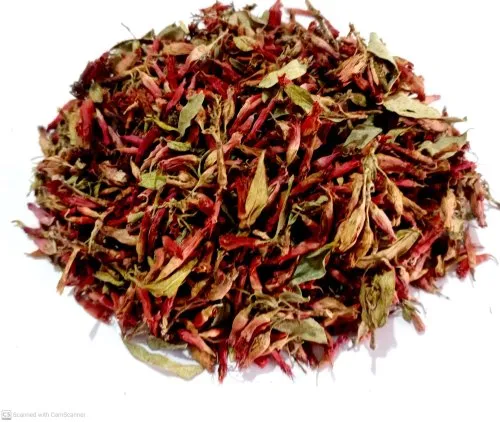Dhataki benefits uses home remedies

What is dhataki?
Dhataki, also known as Woodfordia fruticosa, is a beautiful flowering shrub found throughout India. In Ayurveda, it is considered one of the most potent herbal flowers, prized for its cooling, healing, and rejuvenating properties. Though often overlooked today, this herb plays a major role in classical formulations like Asokarishta and Dashmoolarishta—especially for women’s reproductive health.
Let’s explore why this ancient herb still holds value in modern natural medicine.
Latin Name: Woodfordia fruiticosa
Vernacular Names:
- Hindi: Dhaay ke phool
- Bengali: Dhai
- Tamil: Dhatri jorgi
- Telugu: Are Puvvu sireenji
- Kannada:
- Malayalam: Devadharu
- Marathi: Dhalas
- Gujarati: Dhaava di
- Punjabi: Dhavi
- English : Himalayan Cedar
Sanskrit Names:
Dhatupushpi, Vahnipushpi : Having red colored flowers like blood
Vahnijwala : Flowers are red in colour resembling flame
Guchapushpi : Flowers occurs in bundles
Tamrapushpi: Has coppery red flowers
Madakara : have sedative effect
Madhyavasini: Used in alcoholic preparation
Dadimipatra: Leaves resemble pomegranate leaves
Subhiksha: One plant yield good quantity of flowers
Parvatiya: Commonly grows in hilly region.
Benefits & Ayurvedic Properties of Dhataki
Ras
- Kashay ( Astringent)
Veerya ( Potency)
- Sheet (Cold)
Vipaak ( Post-digestive effect)
- Katu (Pungent)
Guna ( Qualities)
- Laghu (Lightness)
- Rooksha (Dry)
Dosha Effect
Balances: Kapha and Pitta dosha
May increase: Pitta (if overused)
Classical Categorization
In Charak Samhita – It is categorized as
- Purisha sangrahaneya : Group of herbs that is used in increasing bulk of feces cleansing breast milk.
- Mutra Vurajneeya: Group of herb useful restoring normal color of urine.
- Sandhaneeya: Groups of herbs that are used in wound healing and fracture healing
In sushrut samhita & Vagbhata- It is categorized as
- Priyangvadi and Ambashtadi groups of herbs.

Health Benefits of Dhataki
Useful in skin probelms
Several studies show that Dhataki flowers have strong antibacterial and antifungal activity. The flavonoids and tannins present in the flowers inhibit the growth of:
Staphylococcus aureus
E. coli
Candida albican
Potential natural alternative in treating skin infections, wounds, and oral ulcers.
Helps in treating bleeding disorders
Modern phytochemistry confirms Dhataki’s high tannin content, which:
Tightens blood vessels
Helps control bleeding
Reduces inflammation
Helpful in treating bleeding disorders, hemorrhoids, and excessive menstrual flow (menorrhagia).
Helps in managing diarrhea
Dhataki’s astringent nature is supported by modern studies showing reduced intestinal motility and secretion when flower extracts are administered.
It is Effective in diarrhea, IBS, and intestinal infections.
Useful as anti-ageing
Dhataki flowers contain powerful antioxidants like phenolic compounds and flavonoids that help neutralize free radicals.
Benefits include:
Slowing cellular aging
Reducing oxidative stress
Supporting liver detoxification
Modern Use: Supports anti-aging, liver protection, and even neuroprotective functions.
Actions (Karma) of Dhataki in Ayurveda
Madakrut – it causes delerium if taken in excess
Trushna– relieves excess thirst
Atisara– Useful in diarrhea & dysentary
Pittasara – useful in bleeding disorder like menorrhagia
Visha – Useful in toxic condition
Krimihar – Helps in worm infestation and infection.
Visarpa : It is effective in herpes and cellulitis
How to use Dhataki
Dhataki can be consumed in various forms, including:
- Decoction: To make the decoction you need 2 cup water and 1 teaspoon of powder of dhataki flowers. Now add this powder in 2 cup of water and boil till one glass is left. Then filter it, your decoction is ready.
- Dosage : 20 to 30 ml two times a day.
- Dhataki powder: 1-2 teaspoon two times daily . It is also used externally for local application.
- Part Used : Flowers
What are the side effects of Dhataki
Like any other Ayurvedic herb dhataki is having many health benefits . However , it may have some side effects as well They include
Delerium : In high doses it causes delirium.
Allergic Rashes : If someone is sensitive to devdaru they may see skin rashes or redness and ithcing. In this condition it is advisable to discontinue the use .
Precautions
During breast feeding avoid consuming Dhataki
Avoid consuming dhataki during pregnancy due to lack of research on safety during pregnancy.
Always use Dhataki in recommended dosage to avoid potential side effects such as nausea and bloating. It is better to ask Ayurveda doctor about dose and suitability for your body type.
If you have pre existing medical conditions or taking any medications, consult a doctor before using dhataki. This ensures that there are no harmful interactions or contraindications.
Don’t use dhataki continuosly for long period of time . Take break to allow your body to respond appropriately. Also when we use any herb continuosly ,then the body becomes use to it and it don’t respond to it.
Store dhataki in cool and dark place to maintain its potency and prevent it from contamination. Proper storage helps in retaining its therapeutic value.
Home Remedies of Dhataki
Dhataki Decoction for heavy peroids
Ingredients:
Dried Dhataki flowers – 1 tsp
Water – 2 cups
Optional: Shatavari or Ashoka bark (½ tsp)
Instructions:
Boil all ingredients till the water reduces to half.
Strain and drink warm twice a day during your menstrual cycle.
It helps to control excess bleeding and soothes cramps
Skin paste for Acne and Infection
Instructions:
Crush fresh or dried Dhataki flowers with a few drops of rose water or neem water.
Apply as a thin layer on the affected area (boils, acne, or cuts).
Leave for 15–20 minutes, then wash of.
Reduces inflammation, kills bacteria, and speeds healing.
Dhataki infusion for diarrhea
Ingredients:
Dhataki flowers – ½ tsp
Fennel seeds – ½ tsp
Water – 1 cup
Instructions:
Soak ingredients in warm water for 4–6 hours or overnight.
Strain and drink on an empty stomach.
Soothes intestines and stops loose motions naturally.
Frequently asked question
1.Can this herb be used while taking homeopathic medicine ?
Yes. This herb does not react with homeopathic medicine.
2.Can this herb/medicine be continued while taking supplements like multivitamin, omega 3, spirulina ?
Yes .Generally this herb goes well with most dietary supplement. However if you are taking more than one product per day please consult your doctor for opinion.
3. With western/modern medicine
Seek your doctors advice if you are taking this product along with other western (allopathic/modern) medicine. Some ayurvedic herbs can interact with modern medicine.
When taking ayurvedic medicine or herb with modern medicine it is best to keep one hour gap in between both the medicine.
4. How long does dhataki take to start showing benefits ?
It depend on any existing disease, overall health, your prakriti ( genetic make up) all these factors plays a role in how quickly devdaru powder benefits are seen.
5.Can it be used in people with diabetes?
Yes. But always keep watch on your sugar levels. This herb can lower your blood sugar levels. Do not stop your diabetes medicine once you start taking this herb/medicine. Keep in touch with your ayurvedic doctor. They will guide you in this respect.
6.Are there any diet restriction( Pathya) while taking this seeds ?
No .There are no such restriction while taking this product. However if you have been advised with any specific diet based on disease, you should continue to follow it.
Ayurvedic medicine that contains devdaru
Dhataki is one of the ingredients in following medicines
Mustaristham : It is one of the ayurvedic medicine which is used for digestive problems
Sarivadhayasav : This medicine is used in treatment of skin problems and in high uric acid.
Conclusion
Dhataki may not be the flashiest herb in your wellness kit, but its gentle strength, especially in women’s health, digestion, and skin care, makes it a true Ayurvedic gem.
It cools and calms the system
Acts as a natural wound healer
Strengthens internal tissues
Enhances the potency of other herbs in fermented preparations
As Ayurveda teaches: Sometimes, the most beautiful cures are hidden in nature’s simplest gifts.
Disclaimer :The content provided here is for informational purpose only. This blog is not intended to substitute for medical advice, diagnosis or treatment. Always seek medical advice of a qualified healthcare provider for any questions or concern you may have regarding a medical conditions.
.
